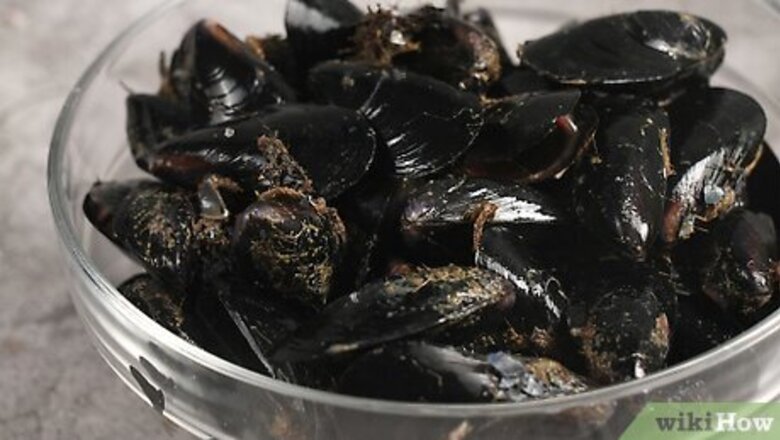
views
Storing Live Mussels in Your Refrigerator
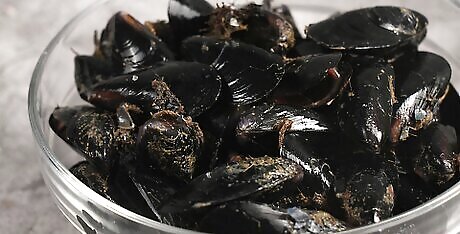
Remove the mussels from the bag and set them in a bowl. Prepare your mussels for storage as soon as you bring them home. Take the mussels out of the bag or container they came in and pour them into a bowl, tray, or other open container. Don't worry about organizing them neatly—piling them up in the container won’t hurt them. Feel free to keep the mussels in a mesh bag or store them loosely. Don't store mussels in a closed container or bag, as they can die and be unsafe to eat. They need to be in an open container to breathe and stay fresh. Alternatively, place a smaller bowl upside down in a larger bowl and place the mussels on top. Or, pour them in a colander and set it on top of a tray. This allows the liquid the mussels produce to drain to the bottom of the bowl without soaking the mussels.

Cover the container with a clean, damp cloth or paper towel. Placing a damp towel over the mussels helps them retain moisture while still enabling them to breathe. Don't add any water directly to the container, though, as this can kill the mussels. Help keep the mussels chilled by filling a plastic bag with ice and placing it on top of the mussels and underneath the damp towel.

Place your mussels on the bottom shelf of your refrigerator. Set the mussels on the bottom shelf of your fridge where they won't leak or drip onto other foods. The bottom of the fridge and towards the back is typically the coldest area, which ensures your mussels stay chilled and fresh. The optimal temperature for storing fresh mussels is between 32 to 40° F (0-4° C). Make sure your mussels don’t get colder or warmer than this range. J. Kenji López-Alt J. Kenji López-Alt, Chef and Food Science Writer Live mussels should be kept cold—between 32-40°F. Place them in a bowl covered with a damp towel rather than submerged in water, which can damage them. Cook mussels within 2 days of purchasing for the best flavor and texture. Discard any with cracked shells before cooking, as they may have spoiled.
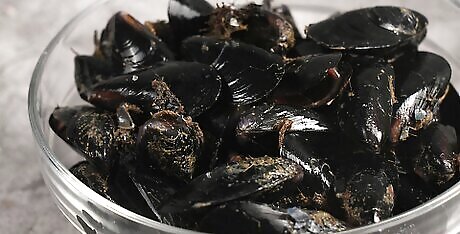
Store the mussels for 2 to 4 days. Cook and eat your mussels within 1 to 2 days of bringing them home for the best taste and texture. If you can’t eat them right away, mussels can stay fresh in the fridge for no more than 4 days. If you haven’t used your mussels after 4 days, throw them away. If you don’t plan on cooking your mussels 1 to 2 days after buying them, freezing them might be a better option, which we’ll explain below.

Pour out the liquid at the bottom of the container daily. As the mussels sit in the container, they produce a small amount of liquid. Just carefully pour out the liquid at the bottom of the container each day so the mussels don’t sit in the water. If you store your mussels in a colander, empty the tray or dish underneath it every day.
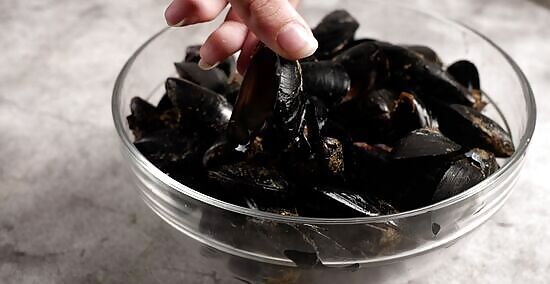
Check on the mussels daily and throw out any spoiled ones. When you drain the excess water in the mussels’ container, make sure they’re all still alive and fresh. Fresh mussels have a mild salty smell, like the ocean, and close their shell when you tap them. If any mussels are damaged, smell rotten, or don’t close their shell, throw them away. If you’re not sure whether a mussel is alive or dead, it’s best to be on the safe side and throw it away. Wait to clean and debeard your mussels until you are ready to cook them, since this process can kill the mussels.
Freezing Live Mussels
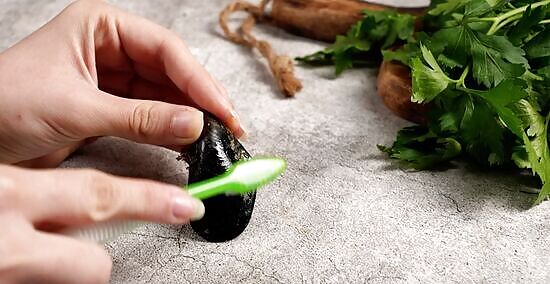
Clean and debeard the mussels. Place the mussels in a colander or bowl and run them under cool water. Gently rub them with your fingers or scrub them with a wire brush to remove any dirt, debris, or barnacles. Then, look for any stringy fibers coming out of the sides of the mussels (which is their “beard”) and pull them off with your fingers. Check for any dead or damaged mussels as you clean them. Throw away any mussels that don’t close their shell, smell spoiled, or have cracked shells. Cleaning and debearding your mussels typically kills them, so don't do this until you are ready to put the mussels in the freezer.
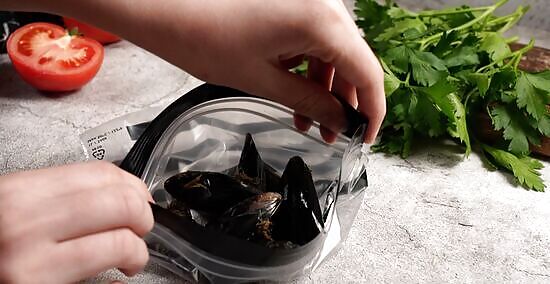
Freeze the mussels in a freezer-safe plastic bag for up to 3 months. Place the mussels in a heavy-duty freezer bag or a freezer-friendly container and squeeze out as much air as possible. Then, set them in your freezer and store them for up to 3 months. Mark the date on your bag or container with a permanent marker so you know how long the mussels have been frozen before you use them. Frozen mussels typically have a softer texture than fresh mussels. Mussels frozen for more than 3 months can be safe to eat, but their quality typically declines sharply. They often have a mushy texture and less flavorful taste.

Cook frozen mussels within 2 days of thawing them. When you're ready to eat your frozen mussels, place them in your refrigerator to thaw overnight. Or, place them in a bowl of cold water for about 1 hour. Thawed mussels keep in your refrigerator for up to 2 days. Don't refreeze your mussels after thawing them. This significantly reduces their quality and can increase the risk of bacterial contamination. Do not thaw frozen mussels at room temperature, as this can lead to bacterial growth.
Preserving Cooked Mussels in the Freezer
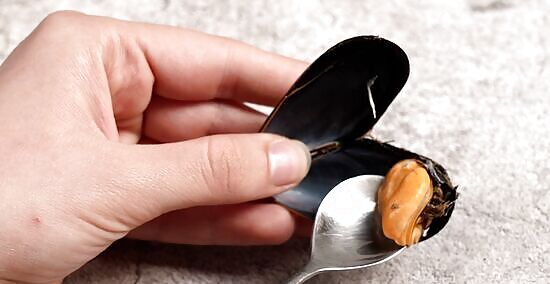
Remove the mussels from their shells. Let the cooked mussels cool down, then pry the shells fully open with your fingers. Carefully remove the meat with a spoon or knife. Removing the meat from the shells helps you save space in your freezer and keep the mussels fresh. Note: Throw away any cooked mussels that don’t open their shells. While there are conflicting opinions on whether it’s safe to eat unopened mussels, it’s typically best to throw them away. Unopened mussels may be undercooked or dead, which at the very least makes them unpleasant to eat.
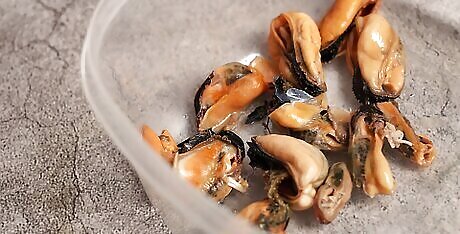
Place the mussels in a leak-proof, freezer-safe container. Add the mussel meat to a sturdy container with an airtight lid. Or, place them in a plastic freezer bag. Just make sure to choose a bag that seals tightly and can hold the mussels and their broth without leaking. Arrange the mussels however you like in the container. You just need to spread them out enough that the cooking broth can cover them.

Cover the mussels in the broth you used to cook them in. The liquid you cook mussels in is called broth. Simply pour in enough broth to completely cover all of the mussels in the container or bag. This helps preserve their flavor. If the broth is still hot, let it cool down before pouring it into the container.

Store the cooked mussels in your freezer for up to 4 months. Tightly close the lid of the container or remove the air in the freezer bag and zip it up. Then, write the date on the container or bag with a permanent marker. Simply place your cooked mussels in the freezer and eat them within 4 months. Thaw your frozen mussels in the refrigerator overnight and use them within 1 to 2 days of thawing. After 4 months, your mussels may become a bit mushy or lose some of their flavor.
Keeping Cooked Mussels in the Refrigerator

Remove the mussel meat from the shell. Wait for the mussels to cool, then completely open the shells with your fingers. Simply take out the mussel meat with a spoon or knife. Taking the mussels out of their shells saves space in your fridge while helping to preserve the meat.

Set the mussels in an airtight container and cover them with broth. Place the cooked mussels in a glass or plastic storage container that tightly seals closed. Then, pour in the mussels’ broth, which is the liquid they cooked in, until the mussels are completely covered. Alternatively, place the mussels in a plastic storage bag.

Store cooked mussels in the refrigerator for 1 to 4 days. Cooked and refrigerated mussels typically taste the best when you eat them within 1 to 2 days. However, they can last up to 4 days in the fridge. The private chefs at Marrow Private Chefs explain that “once mussels are cooked,” they “degrade rapidly.” They recommend freezing cooked mussels if you “plan to [keep] them for more than 12 hours.” Before eating any cooked mussels, check for an unpleasant odor or a slimy texture. These are signs that the mussel has gone bad.
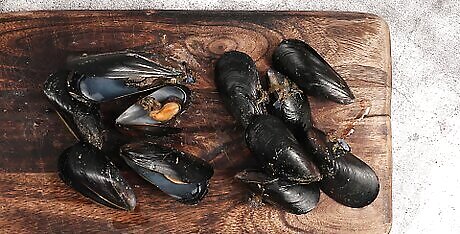
Keep the cooked mussels separate from any uncooked shellfish. Avoid contaminating your cooked mussels with bacteria and dirt by storing them separately from uncooked mussels and other shellfish. Always wash your hands and utensils with warm water and soap after handling uncooked shellfish.
How to Cook Mussels
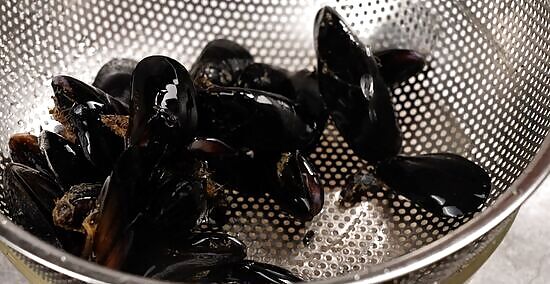
Wash and debeard the mussels. Put the mussels in a colander and rinse them with cool water. Then, use your fingers or a wire brush to scrub off any dirt and debris. Then, pull off any beards, or stringy fibers, coming out of the mussels with your fingers. Throw away any mussels that smell spoiled, have a damaged shell, or don’t close when you tap them.

Fill the bottom of a pan with water and bring it to a boil. Add enough water to a pan so it covers the bottom. Then, set the pan on the stove over high heat until the water boils. It’s okay to stack the mussels on top of each other. Just choose a pan that’s large enough to fit the mussels so they aren’t tightly packed together. For more flavorful mussels, add white wine, chicken broth, olive oil, or butter to the pan instead of water. Cook herbs, spices, and vegetables in your broth, like onion, garlic, shallot, and parsley.
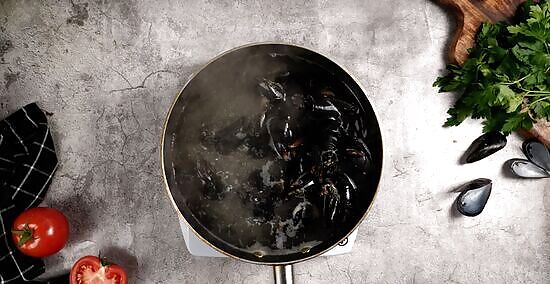
Add the mussels, cover the pan, and let them cook for 5 minutes. With the heat still on high, place the mussels in the boiling water and set a lid on top of the pan. Then, let the mussels cook for 5 minutes. After 5 minutes, the mussels typically open, which means they’re done.
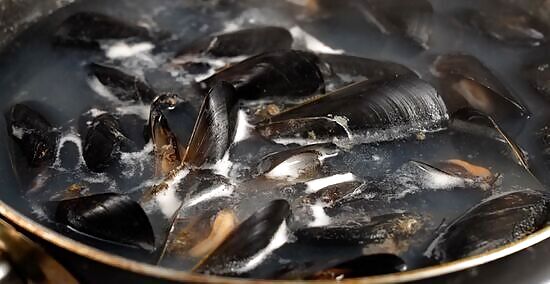
Steam the mussels for 1 to 2 minutes if they aren’t open. If all of the mussels aren’t open after 5 minutes, put the lid back on and let them steam for an additional 1 to 2 minutes. Then, turn off the stove and remove the pan from heat. Don’t eat any unopened mussels and remove them from the pan. This is a sign the mussel is bad or dead.
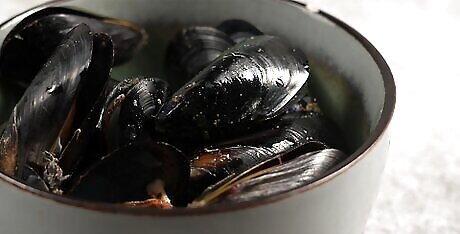
Serve and enjoy the mussels. Place the mussels in a bowl and pour their broth on top. Then, open up the shell, take out the meat with a spoon, and pop it in your mouth! Serve the mussels with toasted, crusty bread for enjoying the broth, too. Garnish your mussels with lemon juice, parsley, or other herbs or spices before eating.
















Comments
0 comment